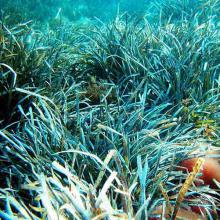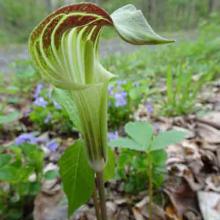Posidonia oceanica
Common name:
Neptune grass
Family:
Posidoniaceae
Order:
Alismatales
Class:
Liliopsida
Arisaema triphyllum
Common name:
Jack-in-the-Pulpit
Family:
Araceae
Order:
Alismatales
Class:
Liliopsida
Posidonia oceanica
Common name:
Neptune grass
Family:
Posidoniaceae
Order:
Alismatales
Class:
Liliopsida
Arisaema triphyllum
Common name:
Jack-in-the-Pulpit
Family:
Araceae
Order:
Alismatales
Class:
Liliopsida
Posidonia oceanica
Common name:
Neptune grass
Family:
Posidoniaceae
Order:
Alismatales
Class:
Liliopsida
Arisaema triphyllum
Common name:
Jack-in-the-Pulpit
Family:
Araceae
Order:
Alismatales
Class:
Liliopsida
Order (Plantae): Alismatales
The Alismatales (alismatids) are an order of flowering plants including about 4500 species. Plants assigned to this order are mostly tropical or aquatic. Some grow in fresh water, some in marine habitats.
Description
The Alismatales comprise herbaceous flowering plants of aquatic and marshy habitats, and the only monocots known to have green embryos other than the Amaryllidaceae. They also include the only marine angiosperms growing completely submerged, the seagrasses. The flowers are usually arranged in inflorescences, and the mature seeds lack endosperm.
Both marine and freshwater forms include those with staminate flowers that detach from the parent plant and float to the surface where they become pollinated. In others, pollination occurs underwater, where pollen may form elongated strands, increasing chance of success. Most aquatic species have a totally submerged juvenile phase, and flowers are either floating or emergent. Vegetation may be totally submersed, have floating leaves, or protrude from the water. Collectively, they are commonly known as "water plantain"
Taxonomy
The Alismatales contain about 165 genera in 13 families, with a cosmopolitan distribution. Phylogenetically, they are basal monocots, diverging early in evolution relative to the lilioid and commelinid monocot lineages. Together with the Acorales, the Alismatales are referred to informally as the alismatid monocots.
Reference: Wikipedia


